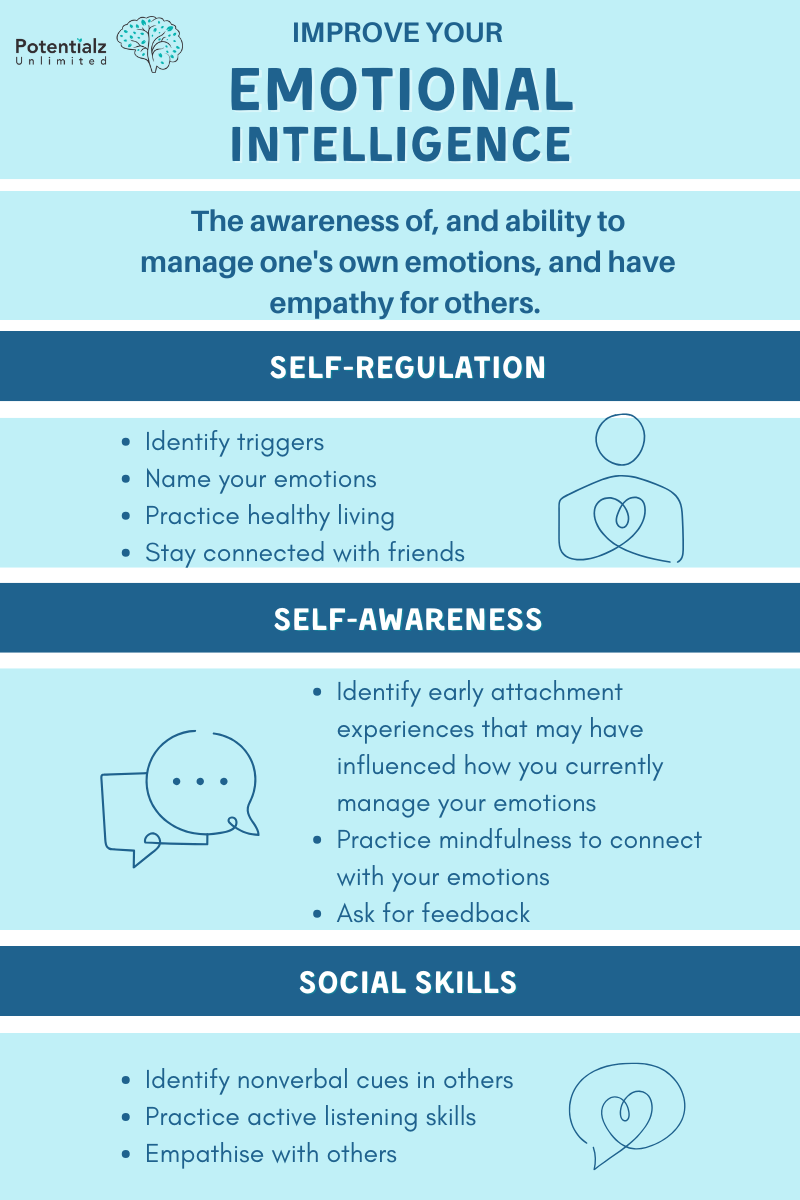
Emotional Intelligence (EI) has emerged as a crucial component of human intelligence, complementing traditional measures of cognitive ability. As research in psychology and neuroscience continues to evolve, the significance of EI in personal, professional, and social contexts has become increasingly apparent. This blog post explores the concept of emotional intelligence, its importance, and its impact on various aspects of human life.
Understanding Emotional Intelligence
Emotional intelligence refers to the ability to recognize, understand, manage, and effectively use emotions in oneself and others. The concept was first introduced by psychologists Peter Salovey and John Mayer in 1990 and later popularized by Daniel Goleman's 1995 bestselling book, "Emotional Intelligence".
Goleman's model of EI encompasses five key components:
Self-awareness
Self-regulation
Motivation
Empathy
Social skills
These components work together to enable individuals to navigate complex social situations, manage stress, make informed decisions, and build meaningful relationships.

The Importance of Emotional Intelligence
Research has consistently shown that emotional intelligence plays a significant role in various aspects of life:
1. Academic and Professional Success
Studies have found a positive correlation between EI and academic performance. Students with higher EI tend to perform better in school and are more likely to succeed in higher education. In the workplace, individuals with high EI often demonstrate better job performance, leadership skills, and career advancement.
2. Mental Health and Well-being
Emotional intelligence is closely linked to mental health and overall well-being. People with higher EI are better equipped to manage stress, cope with challenges, and maintain positive relationships. This emotional resilience contributes to lower rates of anxiety, depression, and other mental health issues.
3. Interpersonal Relationships
EI plays a crucial role in forming and maintaining healthy relationships. Individuals with high EI are more empathetic, better communicators, and more adept at resolving conflicts. These skills contribute to stronger personal and professional relationships.
4. Decision Making and Problem Solving
Emotional intelligence enhances decision-making abilities by allowing individuals to consider both logical and emotional factors. This balanced approach often leads to more effective problem-solving and better outcomes in various life situations.
Developing Emotional Intelligence
The good news is that emotional intelligence can be developed and improved throughout one's lifetime. Here are some strategies to enhance your EI:
Practice self-reflection: Regularly assess your emotions and their impact on your thoughts and behaviors.
Develop empathy: Make a conscious effort to understand others' perspectives and emotions.
Improve communication skills: Focus on active listening and clear, assertive expression of your thoughts and feelings.
Manage stress: Learn and practice stress-management techniques such as mindfulness, meditation, or deep breathing exercises.
Seek feedback: Ask trusted friends, family members, or colleagues for honest feedback about your emotional responses and interpersonal skills.
Read literature on EI: Explore books, articles, and research papers on emotional intelligence to deepen your understanding and gain new insights.
Measuring Emotional Intelligence
As the field of EI has grown, numerous assessment tools have been developed to measure emotional intelligence. Some of the most widely used instruments include:
Mayer-Salovey-Caruso Emotional Intelligence Test (MSCEIT)
Emotional Quotient Inventory (EQ-i)
Trait Emotional Intelligence Questionnaire (TEIQue)
Wong and Law Emotional Intelligence Scale (WLEIS)
These tools can provide valuable insights into an individual's emotional intelligence strengths and areas for improvement.
Conclusion
Emotional intelligence is a vital dimension of human intelligence that complements cognitive abilities. Its impact on personal, professional, and social success is well-documented and continues to be a subject of extensive research. By recognizing the importance of EI and actively working to develop these skills, individuals can enhance their overall well-being, improve relationships, and achieve greater success in various aspects of life.
As our understanding of emotional intelligence continues to grow, it is clear that nurturing this aspect of human intelligence is essential for navigating the complexities of modern life and fostering a more empathetic and emotionally aware society.

Comments